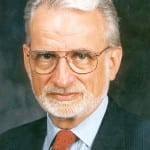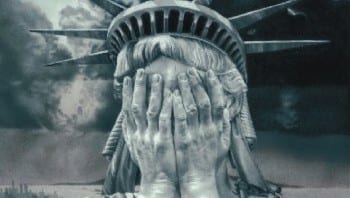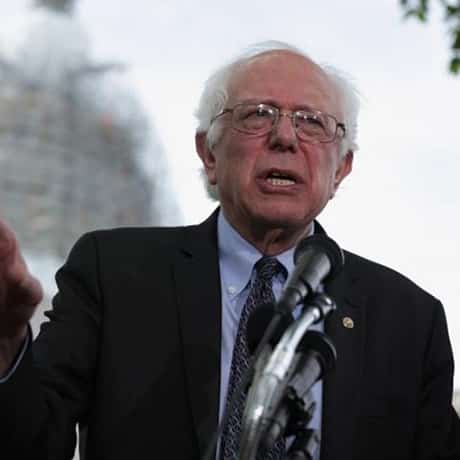THE DUOPOLY WATCH | Steven Jonas, MD, MPH![]()
Special to The Greanville Post | Commentary No. 47: “Bernie and Socialism”
Bernie Sanders seems determined to go to the Convention with his delegates in hand, and who knows? Stranger things have happened in U.S. political history (see, for example, the election of 1876). But whether or not HRC is somehow derailed, there is the matter of the Bernie-or-busters, the already raging “lesser of the evils” argument, and what the not-much-of-a-fan-of-Hillary-but-thoroughly-revolted-by-Trump voter should do. If HRC is the nominee, as I have said for quite some time, the Repubs. and Trump will be running on three words: emails; Benghazi and Clinton. If it were somehow to be Bernie, the red-baiting scream machine would be turned up to a level opt heard since the height of the McCarthy era. Thus it would seem to be a good time to again examine the question of Bernie, socialism, the relationship between them, and how this bears on the upcoming election. (How to deal with the inevitable red-baiting will be the subject of another column, should Bernie in the end turn out to be the Democratic nominee.)
A simple definition of “socialism” is that it is an economic system in which the means of production, distribution, and exchange are in the hands of the working class (in one manner or another) and that the workers holds state power (by one means or another). Historically, “democratic socialism”* has referred to a politico-economic socialist system that has been achieved, in one way or another, through the democratic process, which is then retained in some form or another. The latter is also known as the “parliamentary road to socialism.” “Social democracy,” or the other hand, does not have a distinct definition, other than making “democracy” (however you want to define that, within the context of capitalism) “social,” that is “work better for a majority of the population.”
Bernie has been labelled as a “socialist,” a “democratic socialist,” and a “social democrat.” While one cannot know what Bernie really is, deep down in his mind, one can tell fairly clearly from what he says and how he says it what he is, in the context of the U.S. political process and system. Let us look at one his grand recent statements (of course reflecting his stump speech) about what he is for and what he thinks the important issues are. As for the important issues, he said in part:
- “Incredibly, the wealthiest 62 people on this planet own as much wealth as the bottom half of the world’s population — around 3.6 billion people. The top 1 percent now owns more wealth than the whole of the bottom 99 percent. The very, very rich enjoy unimaginable luxury while billions of people endure abject poverty, unemployment, and inadequate health care, education, housing and drinking water. . .
- “In the last 15 years, nearly 60,000 factories in this country have closed, and more than 4.8 million well-paid manufacturing jobs have disappeared. Much of this is related to disastrous trade agreements that encourage corporations to move to low-wage countries. Despite major increases in productivity, the median male worker in America today is making $726 dollars less than he did in 1973, while the median female worker is making $1,154 less than she did in 2007, after adjusting for inflation.
- “Nearly 47 million Americans live in poverty. An estimated 28 million have no health insurance, while many others are underinsured. Millions of people are struggling with outrageous levels of student debt. . . . Frighteningly, millions of poorly educated Americans will have a shorter life span than the previous generation as they succumb to despair, drugs and alcohol.
- “Meanwhile, in our country the top one-tenth of 1 percent now owns almost as much wealth as the bottom 90 percent. Fifty-eight percent of all new income is going to the top 1 percent. Wall Street and billionaires, through their “super PACs,” are able to buy elections. . . .
- “Let’s be clear. The global economy is not working for the majority of people in our country and the world. This is an economic model developed by the economic elite to benefit the economic elite. We need real change.”
[dropcap]T[/dropcap]hese are resounding words about frightening facts (and they are frightening no matter on which side of the divide one finds oneself — for different reasons). But, and this is a big BUT, like so many left-wingers he does not go on to present an analysis of why this situation exists. But to do so would open up a huge can of worms (capitalist ones as it happens) for him, politically. Because of course the cause of all of the above is rampant capitalism. So Bernie just skips over that part and just goes on to what he recommends for changing this situation.
“We need a president who will vigorously support international cooperation that brings the people of the world closer together, reduces hypernationalism and decreases the possibility of war. We also need a president who respects the democratic rights of the people, and who will fight for an economy that protects the interests of working people, not just Wall Street, the drug companies and other powerful special interests.
“We need to fundamentally reject our “free trade” policies and move to fair trade. . . . We need to end the international scandal in which large corporations and the wealthy avoid paying trillions of dollars in taxes to their national governments. . .
“We need international efforts to cut military spending around the globe and address the causes of war: poverty, hatred, hopelessness and ignorance. . . .
“In this pivotal moment, the Democratic Party and a new Democratic president need to make clear that we stand with those who are struggling and who have been left behind. We must create national and global economies that work for all, not just a handful of billionaires.”
Sounds great, doesn’t it? But in the absence of an analysis of causes, it comes up rather empty. In the presence of the political and economic reality of the United States, regardless of who is the President, just how would one go about getting there? Where does socialism, of whatever stripe and whatever route to establishing it, come in?
Well, among things, what Bernie doesn’t address is the concept of class struggle. The rich have gotten to where they have gotten because they have always been at war with the workers. In recent years, through a variety of strategies and tactics which I have dealt with elsewhere, they have essentially won. One of their prime weapons has been control of the state apparatus, supported by an extremely powerful propaganda apparatus, aka “the free press”, to which Bernie refers above. But does anyone think that one is going to be able to use the state apparatus of which the rich (otherwise known as the “ruling class”) have full control, to be able to wrest away from them the fruits of the (class) struggle in which they have engaged in order to gain those fruits of victory?
Actually, in order to achieve in full what Bernie says is needed in terms of policy (and for the most part I agree with him), unless I have missed something one indeed would have to establish some sort of socialism. But Bernie surely avoids that one. And thus he also avoids the “parliamentary road” question (which, so far, at least, has never worked. The closest a Western capitalist nation ever came to voting in socialism was Italy in 1948 and direct electoral intervention by a combination of the U.S. and the Vatican made sure that that did not happen). Certainly in the U.S., that is not going to happen for the foreseeable future.
Bernie is essentially left with some approach to “fixing capitalism,” along the lines of former Secretary of Labor Robert Reich’s recent book, Saving Capitalism. That approach is certainly not socialism, whether of the “democratic” (so far historically unachievable) variety, or not. The public Bernie rather falls into the category of “social democrat,” as defined above, that is a Democrat who would like the government (the state) to work better in terms of what it does “socially,” for the working class and the other non-owning segments of society. His program is really what I have previously referred to as “the New Deal on Steroids.” As Bernie and his people roar into the Democratic National Convention, as Donald Trump becomes ever more openly fascistic, and as the “lesser-of-the-evils” question becomes ever more on the front burner, I think that it is useful to bear these considerations in mind.
ABOUT THE AUTHOR
 Senior Editor, Politics, Steven Jonas, MD, MPH is a Professor Emeritus of Preventive Medicine at Stony Brook University (NY) and author/co-author/editor/co-editor of over 30 books. In addition to being Senior Editor, Politics, for The Greanville Post, he is: a Contributor for American Politics to The Planetary Movement; a “Trusted Author” for Op-Ed News.com; a contributor to the “Writing for Godot” section of Reader Supported News; and a contributor to From The G-Man. He is the Editorial Director and a Contributing Author for TPJ magazine.us. Further, he is an occasional Contributor to TheHarderStuff newsletter, BuzzFlash Commentary, and Dandelion Salad.
Senior Editor, Politics, Steven Jonas, MD, MPH is a Professor Emeritus of Preventive Medicine at Stony Brook University (NY) and author/co-author/editor/co-editor of over 30 books. In addition to being Senior Editor, Politics, for The Greanville Post, he is: a Contributor for American Politics to The Planetary Movement; a “Trusted Author” for Op-Ed News.com; a contributor to the “Writing for Godot” section of Reader Supported News; and a contributor to From The G-Man. He is the Editorial Director and a Contributing Author for TPJ magazine.us. Further, he is an occasional Contributor to TheHarderStuff newsletter, BuzzFlash Commentary, and Dandelion Salad.
Dr. Jonas’ latest book is Ending the “Drug War”; Solving the Drug Problem: The Public Health Approach (Punto Press, 2016). His last political title was the provocative The 15% Solution: How the Republican Religious Right Took Control of the U.S., 1981-2022: A Futuristic Novel, Brewster, NY, Trepper & Katz Impact Books, Punto Press Publishing, 2013, and available on Amazon.

[printfriendly]




It’s the best time to make a few plans for the longer term and it’s time to be happy.
I’ve learn this post and if I may just I desire to recommend you few interesting
issues or tips. Perhaps you could write subsequent articles
relating to this article. I wish to read even more issues approximately it! http://www.yahoo.net